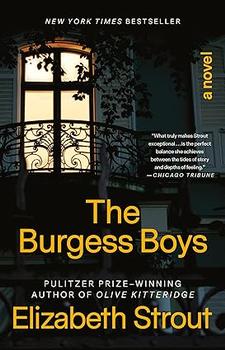Summary | Excerpt | Reading Guide | Reviews | Beyond the Book | Readalikes | Genres & Themes | Author Bio

Helen went downstairs, stepped into the kitchen. "Ana," she said to her housekeeper, who was scrubbing sweet potatoes with a vegetable brush. "Ana, we're going to eat out tonight. You can go home."
The autumn clouds, magnificent in their variegated darkness, were being spread apart by the wind, and great streaks of sunshine splashed down on the buildings on Seventh Avenue. This is where the Chinese restaurants were, the card shops, the jewelry shops, the grocers with the fruits and vegetables and rows of cut flowers. Bob Burgess walked past all these, up the sidewalk in the direction of his brother's house.
Bob was a tall man, fifty-one years old, and here was the thing about Bob: He was a likeable fellow. To be with Bob made people feel as if they were inside a small circle of us-ness. If Bob had known this about himself his life might have been different. But he didn't know it, and his heart was often touched by an undefined fear. Also, he wasn't consistent. Friends agreed that you could have a great time with him and then you'd see him again and he'd be vacant. This part Bob knew, because his former wife had told him. Pam said he went away in his head.
"Jim gets like that too," Bob had offered.
"We're not talking about Jim."
Waiting at the curb for the light to change, Bob felt a swell of gratitude toward his sister-in-law, who'd said, "We'll go across the street for dinner when Jim gets home." It was Jim he wanted to see. What Bob had watched earlier, sitting by the window in his fourth-floor apartment, what he had heard in the apartment down below—it had shaken him, and crossing the street now, passing a coffee shop where young people sat on couches in cavernous gloom with faces mesmerized by laptop screens, Bob felt removed from the familiarity of all he walked by. As though he had not lived half his life in New York and loved it as one would a person, as though he had never left the wide expanses of wild grass, never known or wanted anything but bleak New England skies.
"Your sister just called," said Helen as she let Bob in through the grated door beneath the brownstone's stoop. "Wanted Jim and sounded grim." Helen turned from hanging Bob's coat in the closet, adding, "I know. It's just the way she sounds. But I still say, Susan smiled at me once." Helen sat on the couch, tucking her legs in their black tights beneath her. "I was trying to copy a Maine accent."
Bob sat in the rocking chair. His knees pumped up and down.
"No one should try and copy a Maine accent to a Mainer," Helen continued. "I don't know why the Southerners are so much nicer about it, but they are. If you say 'Hi, y'all' to a Southerner, you don't feel like they're smirking at you. Bobby, you're all jumpy." She leaned forward, patting the air. "It's all right. You can be jumpy as long as you're okay. Are you okay?"
All his life, kindness had weakened Bob, and he felt now the physicality of this, a sort of fluidity moving through his chest. "Not really," he admitted. "But you're right about the accent stuff. When people say, 'Hey, you're from Maine, you can't get they-ah from he-yah,' it's painful. Painful stuff."
"I know that," Helen said. "Now you tell me what happened."
Bob said, "Adriana and Preppy Boy were fighting again."
"Wait," said Helen. "Oh, of course. The couple below you. They have that idiot little dog who yaps all the time."
"That's right."
"Go on," Helen said, pleased she'd remembered this. "One second, Bob. I have to tell you what I saw on the news last night. This segment called 'Real Men Like Small Dogs.' They interviewed these different, sort of—sorry—faggy-looking guys who were holding these tiny dogs that were dressed in plaid raincoats and rubber boots, and I thought: This is news? We've got a war going on in Iraq for almost four years now, and this is what they call news? It's because they don't have children. People who dress their dogs like that. Bob, I'm awfully sorry. Go on with your story."
Excerpted from The Burgess Boys by Elizabeth Strout. Copyright © 2013 by Elizabeth Strout. Excerpted by permission of Random House, a division of Random House, Inc. All rights reserved. No part of this excerpt may be reproduced or reprinted without permission in writing from the publisher.
Happiness makes up in height for what it lacks in length.
Click Here to find out who said this, as well as discovering other famous literary quotes!
Your guide toexceptional books
BookBrowse seeks out and recommends the best in contemporary fiction and nonfiction—books that not only engage and entertain but also deepen our understanding of ourselves and the world around us.